Clinical Epidemiology is the “study of groups of people to achieve the background evidence needed for clinical decisions in patient care” (White, 1996). It must generate the best possible evidence from groups of individuals regarding the effectiveness and efficiency of various clinical courses of action. It must also translate this evidence (or the lack thereof) into rational clinical decisions pertaining to the management of individual patients.
Clinical Epidemiology utilizes techniques developed by classical epidemiology and adapts these to the study of individual patients. It incorporates concepts from related fields such as Biostatistics, Health Social Science, and Health Economics. It deals mainly with the teaching of clinical research methodology and evidence-based medicine. Clinical Epidemiology is an evolving discipline and is considered as a basic science in clinical medicine.
VISION
A trans-disciplinary center of excellence in the education of health care professionals and application of clinical epidemiology principles towards achieving accessible, equitable, efficient, ethical and culturally sensitive health care for all Filipinos
MISSION
Guided by science and compassion, we commit to the education of health care professionals in clinical epidemiology and its related disciplines for improved evidence-based decision making in health care and policies that engages patients, families and communities.
GOALS
- To train health care providers in quantitative and qualitative assessment principles drawn from clinical epidemiology, biostatistics, health economics and health social sciences.
- To generate relevant health research addressing the priority health needs of the Filipino people.
- To provide technical assistance in the evaluation of the health needs of the country, identification of effective and efficient health interventions, rational allocation of resources and successful implementation and monitoring of health programs.
In the early 1980s, the Rockefeller Foundation issued a call to major medical schools in the world to participate in a new initiative which would promote clinical practice based on the best evidence of effectiveness and efficient use of resources. The springboard for this new initiative was the training of physicians in clinical epidemiology. Subsequently, other disciplines of biostatistics, clinical economics and health social sciences were introduced to comprise a holistic perspective of health and health care. The University of the Philippines College of Medicine was one of the first medical schools to respond to this call, and since then, it has been and continues to be the leading center for clinical epidemiology in the Philippines.
Training in the field of Clinical Epidemiology started in the early 1980s in three centers - McMaster University in Canada, University of Pennsylvania in Philadelphia, and the University of Newcastle in Australia. The Philippines was among the first countries in the developing world to send trainees in the field. Training in Clinical Epidemiology involved completion of a Masters’ degree and successful defense of a thesis. These training programs were funded directly by the Rockefeller Foundation and later, through the International Clinical Epidemiology Network (INCLEN) and Philippine Council for Health Research and Development.
The first Clinical Epidemiology Unit (CEU) in the Philippines was established out of firm belief that epidemiological skills and concepts are important in the training, service and research activities of a clinician. The groundwork for its establishment was laid out in 1982 by Dr. Kerr White, then Associate Director for Health Sciences of the Rockefeller Foundation, and Dr. Ernesto O. Domingo, then Chair of the PGH Department of Medicine. It became operational in 1984 as a unit under the Department of Medicine led by Dr Mary Ann D. Lansang, the first clinical epidemiologist in the country. In 1990, CEU transferred to its new office at Paz Mendoza Building.
The training of specialist physicians from various departments continued. With the addition of biostatisticians, health social scientists and clinical economists into the unit and with more graduates from other clinical specialties, the CEU eventually became a unit under the office of the Dean of the College of Medicine in 1992. In a short period of time, a critical mass had been trained and they have since advocated the use of clinical epidemiology in research, education and clinical practice.
Pioneering Activities of the then CEU (now Department of Clinical Epidemiology – DCE):
- Introduced the discipline of clinical epidemiology to medical residents, fellows and students of the UP College of Medicine through regular short courses/training workshops on critical appraisal of the medical literature and research methodology.
- Introduced the concept and practice of Evidence Based Medicine to medical practitioners.
- Created the first Master of Science in Clinical Epidemiology program in the Philippines in 1992
- Started teaching Basic Research Methods courses in the undergraduate programs for Year Levels III, IV, V and VI in 1992
- Provided methodological and statistical support for research projects
Since 1992, the Clinical Epidemiology Unit has offered the Master of Science in Epidemiology (Clinical Epidemiology), a joint program offering with the Department of Epidemiology and Biostatistics of the UP College of Public Health, which offers the Public Health Epidemiology track.
In 1998, the unit was one of the key players in the development of the Master in Clinical Medicine program of the College of Medicine. The Master in Clinical Medicine program includes courses in Clinical Epidemiology, plus a Clinical Statistics course, which was specifically created for these programs.
Recognizing the distinct functions of the CEU and the evolving discipline of Clinical Epidemiology in education and research, the Board of Regents (BoR) approved the creation of the Department of Clinical Epidemiology under the UP College of Medicine-Manila on May 27, 1999 in its 1131st meeting. The creation of the new Department was for better coordination of the undergraduate, graduate and postgraduate programs offered by the unit and to further promote the discipline of Clinical Epidemiology. The Department’s primary role is the administration of the academic activities in Clinical Epidemiology while the Institute of Clinical Epidemiology under the National Institutes of Health is primarily responsible for the conducting the research activities of the faculty. As per the BoR resolution --- the director of the Institute shall also be the chair of the Department.
DIRECTORS/CHAIRS:
Founding Head
Dr. Ernesto O. Domingo, MD National Scientist
Dr. Mary Ann D. Lansang 1984 – 1987
Dr. Corazon A. Ngelangel 1987 – 1989
Dr. Renato B. Dantes+ 1990 – 1993
Dr. Tessa Tan–Torres Edejer 1993 – 1998
Dr. Mario R. Festin 1998 – 2000
Prof. Cynthia P. Cordero 2000 – 2003
Dr. Noel R. Juban 2004 – 2012
Dr. Marissa M. Alejandria 2013 – 2018
Dr. Jacinto Blas V. Mantaring III August 2018 - present
I. Master of Science in Epidemiology (Clinical Epidemiology)
The UP College of Medicine and the College of Public Health are jointly offering the Master of Science in Epidemiology with 2 tracks: Clinical Epidemiology and Public Health Epidemiology. Clinical epidemiology enables health professionals to successfully implement a health program or to deliver better health care to patients using evidence generated from research. The program is also designed to equip clinicians with skills necessary to generate and evaluate valid and reliable research on health problems that they encounter. The program consists of 34 units - 5 units core courses; 19 units major courses, 4 units electives; and 6 units thesis. The recommended time for completion for the coursework is one school year (full – time) or two years (part – time).
Schedule
YEAR 1
|
Course Number |
Course Title |
Units |
Prerequisite |
|
|
FULL-TIME |
PART-TIME |
|
|
|
|
1st semester |
||||
|
CE 201 |
CE 201 |
Concepts of Clinical Economics and Health Social Sciences |
2 |
|
|
CE 211 |
CE 211 |
Fundamentals of Clinical Epidemiology |
2 |
|
|
CE 212 |
CE 212 |
Basic Clinical Research Methodology |
2 |
CE 211 |
|
CE 213 |
CE 213* |
Critical Appraisal of Medical Literature |
1 |
CE 211 |
|
CE 218 |
CE 218 |
Ethics in Clinical Epidemiology |
1 |
|
|
*BIOSTAT 201 |
|
Fundamentals of Biostatistics 1 |
3 |
|
|
*BIOSTAT 202 |
|
Fundamentals of Biostatistics 2 |
2 |
|
|
2nd semester |
||||
|
CE 214 |
CE 214 |
Research Organization and Management |
2 |
|
|
CE 215 |
|
Synthesis of Research |
2 |
BIOSTAT 101 & 202 or CE 205, CE 211, CE 212 |
|
CE 217 |
CE 217 |
Research Designs in Clinical Epidemiology |
2 |
CE 211, CE 212 |
|
CE 221 |
CE 221 |
Principles and Techniques of Health Policy Formulation |
2 |
|
|
CE 298 |
|
Independent Study |
3 |
CE 211, CE 212, BIOSTAT 201 or CE 205 |
|
Elective 1 |
Elective 1 |
|
|
|
|
Elective 2 |
|
|
|
|
*offered by the Department of Epidemiology & Biostatistics, College of Public Health
YEAR 2
|
Course Number |
Course Title |
Units |
Prerequisite |
|
|
FULL-TIME |
PART-TIME |
|
|
|
|
1st semester |
||||
|
CE 300 |
|
Thesis |
6 |
|
|
|
BIOSTAT 201 |
Fundamentals of Biostatistics 1 |
3 |
|
|
|
BIOSTAT 202 |
Fundamentals of Biostatistics 2 |
2 |
|
|
2nd semester |
||||
|
Residency |
|
|
|
|
|
|
CE 215 |
Synthesis of Research |
2 |
BIOSTAT 201 & 202 or CE 205, CE 211, CE 212 |
|
|
CE 298 |
Independent Study |
3 |
BIOSTAT 201 or CE 205, CE 211, CE 212 |
|
|
Elective 2 |
|
|
|
YEAR 3
|
Course Number |
Course Title |
Units |
Prerequisite |
|
|
FULL TIME |
PART TIME |
|
|
|
|
1st semester |
||||
|
Residency |
CE 300 |
Thesis |
6 |
|
|
|
|
|
|
|
|
2nd semester |
||||
|
|
Residency |
|
|
|
Electives
|
Course Number |
Course Title |
Units |
Prerequisite |
|
CE 205 |
Clinical Statistics |
5 |
|
|
CE 207 |
Advanced Clinical Statistics |
2 |
BIOSTAT 201 & 202 or CE 205 |
|
CE 222 |
Advances in Clinical Economics |
2 |
BIOSTAT 201 & 202 or CE 205 |
|
CE 223 |
Informatics for Clinical Decision Making |
2 |
CE 213 |
|
CE 224 |
Medical Writing and Communications |
2 |
|
|
CE 297 |
Seminars in Health Social Science |
2 |
|
|
CE 299 |
Social Science Research Methods in Health |
2 |
|
|
*Pharma 250 |
Introduction to Pharmacoepidemiology |
2 |
|
*offered by the Department of Pharmacology and Toxicology, UPCM
NOTE:
- All students are required to enroll for residency after completion of their coursework and until they successfully defended their thesis.
- Diploma and MS students who were not able to finish after two years and five years respectively, must apply for extension of their residency.
- Diploma students have the option to pursue a Master’s degree. However, the validity of their coursework is for five years only.
Summary of Courses
Core Courses : 5 units
Major Courses : 19 units
Electives : 4 units
Thesis : 6 units
TOTAL : 34 units
Elective 1 Elective 2
CE 223 CE 207
CE 224 CE 222
CE 297
CE 299
II. Diploma in Epidemiology (Clinical Epidemiology)
The Diploma in Epidemiology (Clinical Epidemiology) is a non-thesis option for students who would like to only complete the academic requirements of the program.
Both the M.S. and Diploma programs in Clinical Epidemiology are designed to equip clinicians with skills to generate and evaluate new information and technology relevant to their field of work. Specifically, the graduates should be able to:
- Demonstrate skills in the application of epidemiologic concepts and principles to the solution of clinical and public health problems;
- Deliver technical services to clinicians or public health workers on how to properly identify factors in disease causation; evaluate the reliability and validity of measurements; determine the efficacy and effectiveness of interventions; plan strategies for disease control/prevention; devise methods for evaluating health technology programs; and generate research whose results can be bases for health policy formulation.
- Develop a critical attitude in evaluating scientific literature and information in the management of health problems.
- Appreciate the role of both health economics and the social sciences in making health interventions efficient and culturally acceptable.
- Identify, plan, implement, analyze and interpret clinical or public health research projects.
From Academic Year 1992-93 to 2019-2020, the Department has trained 261 MS Clinical Epidemiology and 24 Diploma in Clinical Epidemiology students.
III. Undergraduate Courses (Doctor of Medicine Degree)
IDC 211 (Introduction to Basic Health Research) Course Description: This is the first of a series of courses imparting knowledge on the principles and application of basic health research methods. Expertise on the basic sciences as a minefield of research ideas is provided by the different basic science faculty (Anatomy, Physiology, Biochemistry and Pharmacology) while expertise on research methodology is provided by the faculty of the Department of Clinical Epidemiology.
IDC 212 (Introduction to Clinical Epidemiology) Course Description: The second of the series of research methods courses focuses on the concepts of Clinical Epidemiology - issues of normality and abnormality, disease frequency, risk assessment, causation, prognosis, treatment and disease prevention, hypothesis testing, summarizing the evidence and knowledge translation.
IDC 213 (Introduction to Evidence-Based Medicine) Course Description: This is a three-day course on “Evidence Based Clinical Decision Making”. The general objective of the course is to introduce the concept of critical appraisal of the medical literature and applying the research findings to clinical decision-making. The teaching methods in this course are plenary lectures, small group discussions, group presentations and hands-on medical literature search.
CE 291 (Clinical Epidemiology Research Elective) Course Description: This is a four-week rotation wherein the student is paired with a consultant with an ongoing research project. The student is exposed to various stages of a research project, from proposal development, questionnaire design, project implementation, statistical analysis, report preparation, health policy implications and use of evidence.
Email address: dce_cm.upmanila@up.edu.ph
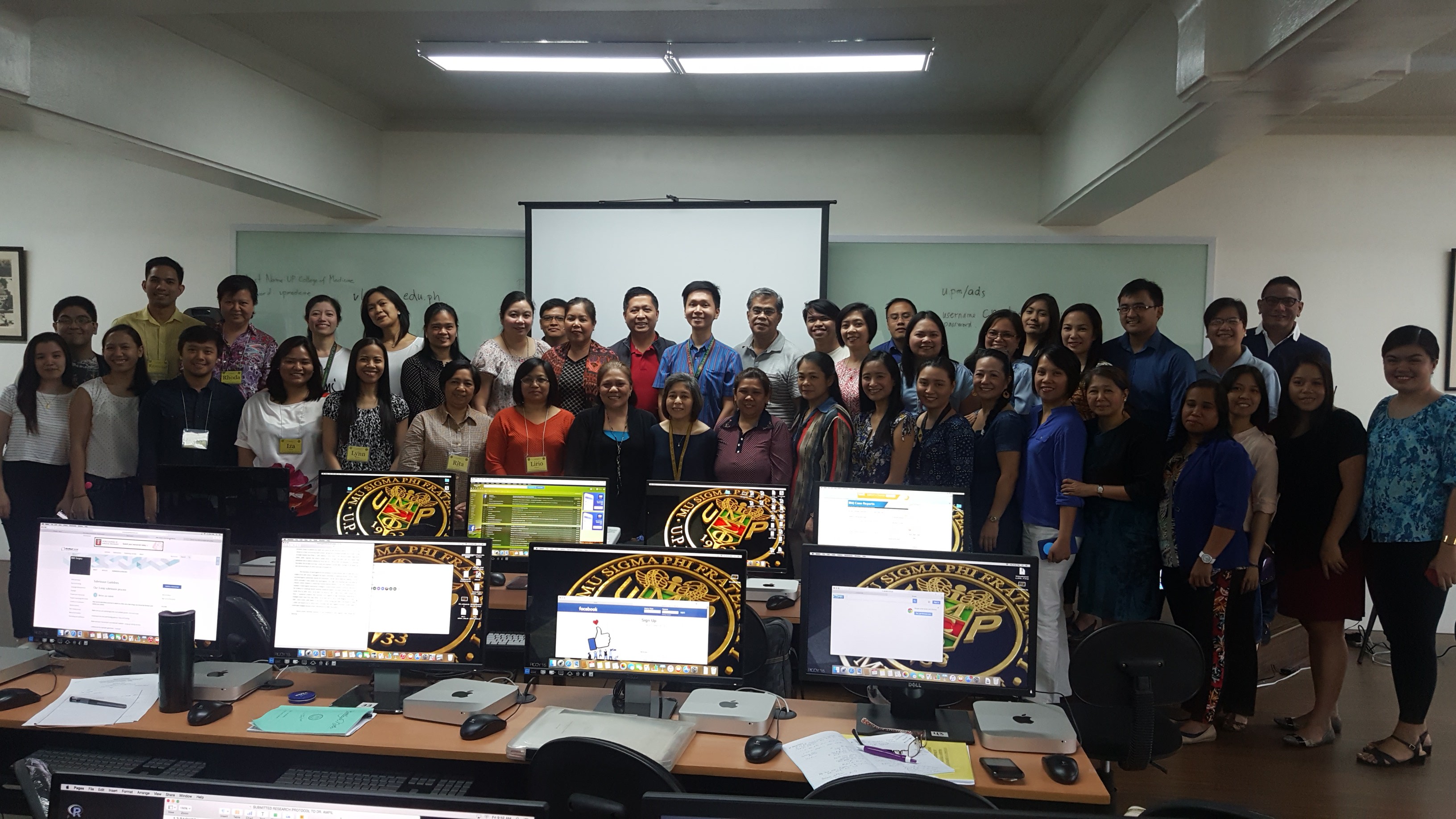
.JPG)
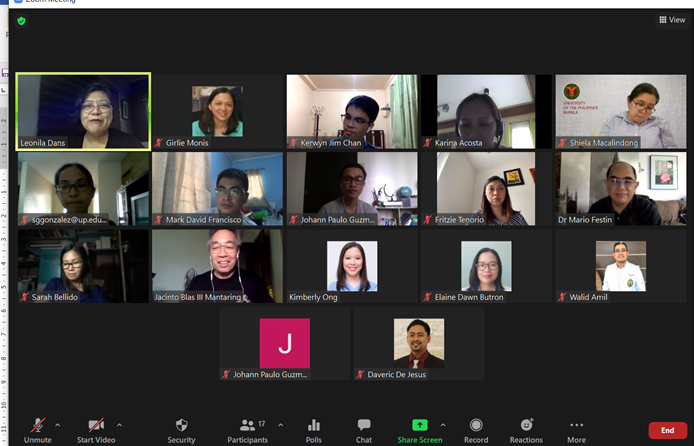
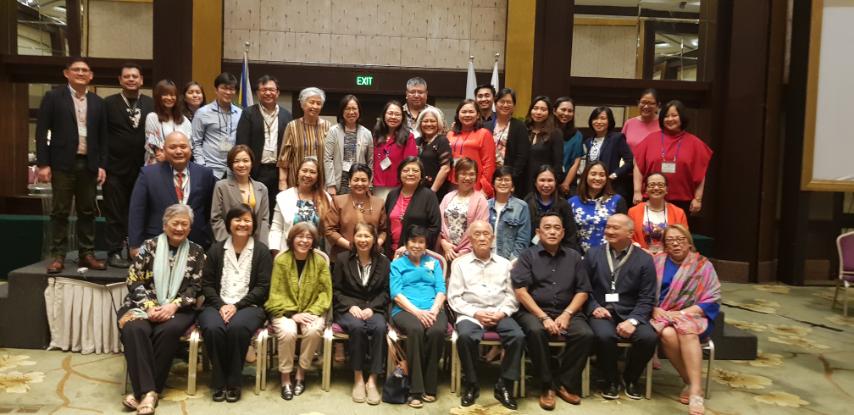
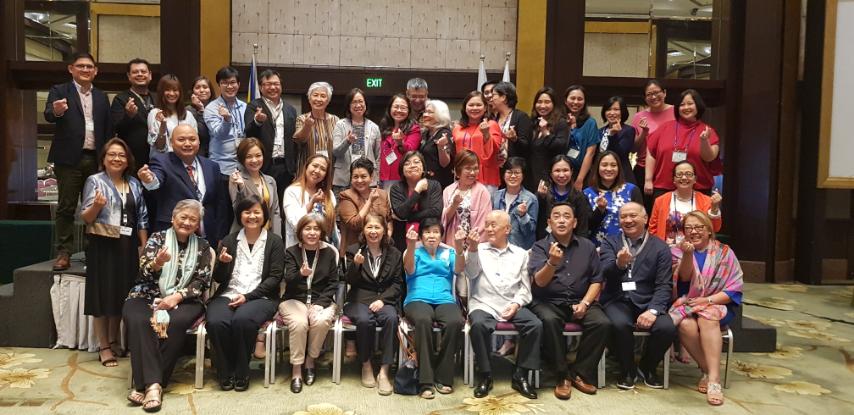
.png)
.jpg)
.JPG)
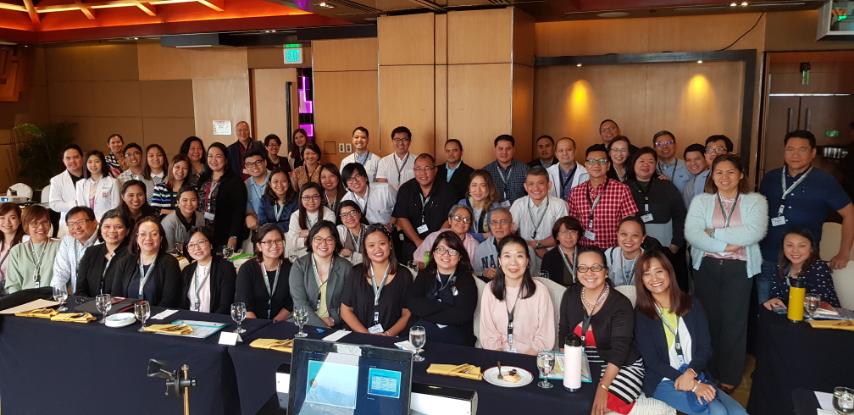
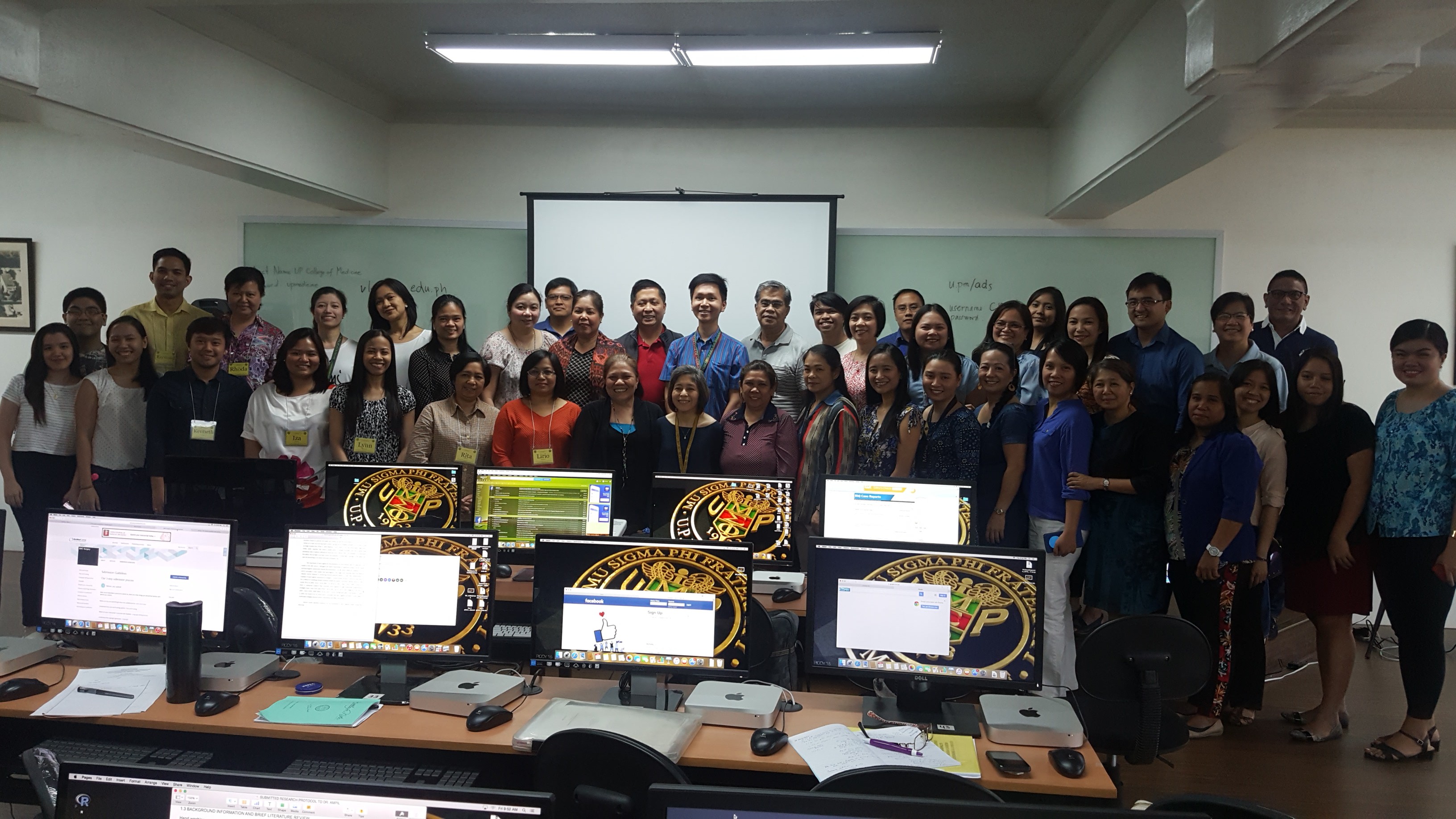
Regular Faculty
Jacinto Blas V. Mantaring, MD, MSc
Professor and Chair
Clinical Epidemiologist and Neonatologist
Email: jvmantaring@up.edu.ph
Marissa M. Alejandria, MD, MSc
Professor and Assistant Chair for Research
Clinical Epidemiologist and Infectious Diseases Specialist
Email: mmalejandria@up.edu.ph
Maria Lourdes E. Amarillo, MPH
Professor
Biostatistician
Email: meamarillo@up.edu.ph
Nina T. Castillo-Carandang, MA, MSc, PhD
Professor and Assistant Chair for Administration
Health Sociology, Global Health
Email: ntcastillocarandang@up.edu.ph
Cynthia P. Cordero, MSc, MMedStat
Professor and Assistant Chair for Academic Affairs/Graduate Program Director
Biostatistician
Email: cpcordero@up.edu.ph
Carol Stephanie C. Tan-Lim, MD, MSc
Professor
Clinical Epidemiologist, Pediatrics/Allergy & Immunology
Email: cctan7@up.edu.ph
Carlo Irwin A. Panelo, MD, MA
Professor
Clinical Economist
Email: capanelo@up.edu.ph
Clinical Professor
Mary Ann D. Lansang, MD, MSc
Clinical Epidemiologist and Infectious Diseases Specialist
Email: mlansang@post.upm.edu.ph
Current Cross Appointees from Clinical Departments in the UP College of Medicine
Leonila F. Dans, MD, MSc
Professor, Department of Pediatrics
Clinical Epidemiologist and Pediatric Rheumatologist
Email: lddans@up.edu.ph
Mario R. Festin, MD, MSc, MHPEd
Professor, Department of Obstetrics and Gynecology
Clinical Epidemiologist and Obstetrician-Gynecologist
Email: mrfestin@up.edu.ph
Maria Antonia A. Habana, MD, MSc
Professor, Department of Obstetrics and Gynecology
Clinical Epidemiologist and Obstetrician-Gynecologist
Email: mehabana@up.edu.ph
Felix Eduardo R. Punzalan, MD, MSc
Clinical Associate Professor, Department of Medicine
Clinical Epidemiologist and Cardiologist
Email: frpunzalan@up.edu.ph
Senior Lecturer
Mark Anthony U. Javelosa, MS
Biostatistician
Email: mujavelosa@up.edu.ph
Research Faculty from UP Manila National Institutes of Health with Teaching Assignments in the Department of Clinical Epidemiology
Emmanuel S. Baja, Sc.D.
Research Associate Professor
Environmental Epidemiologist
Email: esbaja@up.edu.ph
Ian Theodore G. Cabaluna
Research Assistant Professor
Clinical Epidemiologist and Pharmacist
Email: igcabaluna@up.edu.ph
Antonio Miguel L. Dans, MD, MSc
Adjunct Research Faculty
Clinical Epidemiologist, Adult Medicine Specialist and Cardiologist
Email: aldans@up.edu.ph
Emmanuel P. Estrella, MD, MSc
Research Professor
Clinical Epidemiologist and Orthopedic Specialist
Email: epestrella@up.edu.ph
Mary Ann J. Ladia, PhD
Research Associate Professor
Medical Anthropologist
Email: mjladia1@up.edu.ph
Hilton Y. Lam, MHA, PhD
Research Professor
Clinical Economist
Email: hylam@up.edu.ph
Marie Carmela M. Lapitan, MD, MSc
Research Professor
Urologist
Email: mmlapitan@up.edu.ph
Olivia T. Sison, MSPH
Research Assistant Professor
Biostatistician and Epidemiologist
Email: otsison@up.edu.ph
John Mark Velasco, MD, MSc
Research Associate Professor
Institute of Molecular Biology and Biotechnology
Emerging Infectious Diseases Specialist
Email: Jsvelasco@up.edu.ph
Clinical Associate Professor
Jose Rafael A. Marfori, MD, MPH
Special Assistant to the Director
Philippine General Hospital
Public and Global Health Specialist
Email: jamarfori@up.edu.ph
Adminisrative Staff
Administrative Officer
Girlie C. Monis
Email: gcmonis@up.edu.ph
Administrative Assistant
Sandra Lesigues
Email: srlesigues@up.edu.ph
The Department of Clinical Epidemiology occupies four rooms of the Paz Mendoza Building. These rooms serve as the offices of the chair, the faculty members and the students. The Department has a conference room where business meetings are usually held and a nook for small meetings. Classes are usually held in the conference room or in one of the rooms (Room 108) of Paz Mendoza Building.
The Department also maintains a library that houses books and journals on medicine, epidemiology/clinical epidemiology, biostatistics, health social science, and clinical economics and health policy. The library has one computer desktop that has installed software (mostly on statistics) wherein DCE faculty and clinical epidemiology students can freely access. There is two working telephone lines with a fax machine. The Department has its own private internet service provider. It has also audio-visual equipment, including LCD projectors, video camera recorder and a television.
SERVICES
Training Workshops
- Research Methodology
- Evidence-based Medicine
- Development of Systematic Reviews
- Development of Clinical Practice Guidelines
- Good Clinical Practice and Ethics
- A Mixed Methods Approach to Health Research
- Data Management and Statistics for Health Research
- Effective Writing and Presentation of Scientific Researches
- Training for Technical Review Board Members
We also offer:
- Consultations for research projects/protocols
- Mentoring for research projects
- Extension services specially for partner agencies such as DOH, PhilHealth, PCHRD and professional medical societies
- Statistical consultations and data analysis
|
FACULTY |
RESEARCH AREAS / EXPERTISE |
|
Dr. Marissa M. Alejandria* |
Clinical Epidemiology, Infectious Diseases |
|
Prof. Maria Lourdes E. Amarillo* |
Biostatistics, Public Health |
|
Dr. Emmanuel S. Baja |
Environmental Health & Epidemiology, Population Health and Mental Health |
| Dr. Ian Theodore G. Cabaluna | Clinical Epidemiology, Pharmaceutical Sciences |
|
Dr. Nina T. Castillo-Carandang* |
Health Sociology, Global Health, Health Social Science, Clinical Epidemiology |
|
Prof. Cynthia P. Cordero* |
Biostatistics, Public Health |
|
Dr. Antonio Miguel L. Dans |
Clinical Epidemiology, Primary Health Care, Adult Medicine, Cardiology |
|
Dr. Leonila F. Dans |
Clinical Epidemiology, Pediatric Rheumatology |
|
Dr. Emmanuel P. Estrella |
Clinical Epidemiology, Orthopedics, Hand Surgery, Reconstructive Microsurgery and Biomedical Device |
|
Dr. Mario F. Festin |
Clinical Epidemiology, Obstetrics-Gynecology, Reproductive Health (including Family Planning and Contraception) Implementation Research and Science |
|
Dr. Maria Antonia E. Habana |
Clinical Epidemiology, Obstetrics-Gynecology, Reproductive Endocrinology and Infertility |
|
Prof. Mark Anthony U. Javelosa |
Biostatistics |
|
Dr. Mary Ann J. Ladia |
Health Social Sciences, Medical Anthropology |
| Dr. Hilton Y. Lam | Health Economics, Health Policy, Health Technology Assessment & Disease Modelling |
| Dr. Mary Ann D. Lansang | Clinical Epidemiology, Infectious Diseases, Health Policy & Systems Research |
| Dr. Marie Carmela M. Lapitan | Urology, Incontinence, Surgery, Patient Safety and Health Informatics |
| Dr. Carol Stephanie C. Tan-Lim* | Clinical Epidemiology, Pediatrics/Allergy & Immunology |
|
Dr. Jacinto Blas V. Mantaring III* |
Clinical Epidemiology, Neonatology/Pediatrics, Health Research Ethics |
|
Dr. Jose Rafael A. Marfori |
Health Systems, Primary Care, Public and Global Health |
|
Dr. Carlo Irwin A. Panelo* |
Health Economics, Health Policy, Health Systems |
|
Dr. Felix Eduardo R. Punzalan |
Clinical Epidemiology, Cardiology |
|
Prof. Olivia T. Sison |
Biostatistics, Public Health, Epidemiology |
| Dr. John Mark S. Velasco | Emerging Infectious Disease Molecular Epidemiology, Public Health, Clinical Trials |
Contact Information:
Address: Department of Clinical Epidemiology
Room 103 Paz Mendoza Building
UP College of Medicine
547 Pedro Gil St, Ermita, Manila
Telefax: (632) 8525-4098
Email address: updce@post.upm.edu.ph
| Contact No. | |
| Other Contact Information |